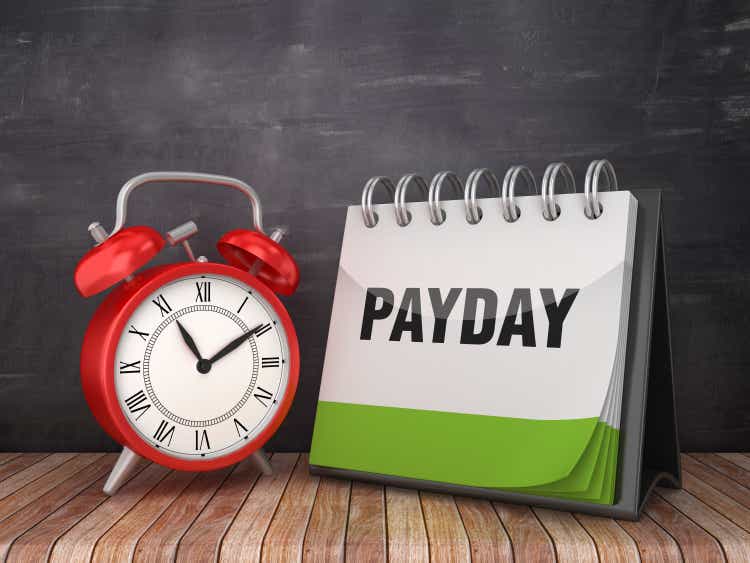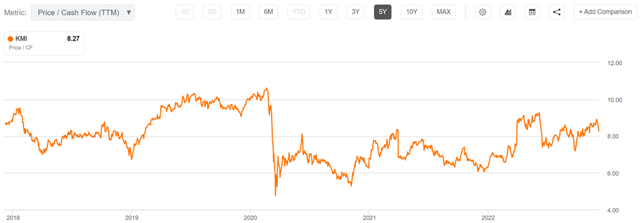porcorex
The market goes up and down, and that’s why stocks are not right for everybody, especially for “efficient market theorists” who view the current share price as being the true value of any given company. Those investors may be better off locking up their capital in a private investment vehicle run by Blackstone (BX), but also comes with drawbacks, as the halt in redemption requests made headlines this month.
For savvy investors who are well attuned to the trials and tribulations of the market, swinging stock prices are a great thing, especially when it comes to high yielding stocks. That’s because a decline in the stock price has a far more meaningful impact on a high dividend yield versus a low yield.
Moreover, investors like Warren Buffett know that stocks are frequently mispriced, giving them an inherent advantage in this asset class as opposed to, say, real estate, where assets are usually accurately priced.
This brings me to Kinder Morgan (NYSE:KMI), which now appears more appealing since falling from the $19+ level over the past couple of weeks, pushing the dividend yield well above the important 6% mark. This article highlights why income and value investors ought to give KMI a hard look on the drop, so let’s get started.
Why KMI?
Kinder Morgan is one of the largest midstream energy companies in North America, serving most major U.S. gas supply and demand regions. It operates 70K miles of natural gas pipelines, nearly 10K miles of oil and NGL pipelines, and has 700 billion cubic feet of natural gas storage capacity. To get a sense of KMI’s essential nature to the economy, its daily gas transportation capacity is equivalent to 40% of average U.S. gas consumption, and it handles 50% of the LNG market.
Energy is constantly a hot topic, especially with climate concerns coming to the forefront in recent years. This has resulted in bottlenecks and cancellations on large-scale projects over the past few years, reducing the number of expansion projects available to KMI. However, this is not necessarily a bad thing, as competitors also feel the pinch, and this therefore reduces competition. It also enables more cash to be returned to shareholders, and KMI has executed on that, with $300 million in share buybacks in the first nine months of this year alone.
Meanwhile, KMI is demonstrating solid operating fundamentals, with distributable cash flow growing by 11% YoY to $1.1 billion during the third quarter. This equates to DCF per share of $0.49, which is nearly double that quarterly dividend amount of $0.25. These strong results were driven by favorable demand for natural gas and storage services around the country, as well as favorable contract renewals on multiple assets across KMI’s vast network.
Looking forward, KMI has a strong project backlog of lower carbon energy services, including those in the renewable natural gas, renewable diesel and feedstocks space. This makes KMI well positioned to participate in the SAF (sustainable aviation fuel) market, which is projected to see robust growth in an increasingly climate-conscious environment. According to Future Market Insights, the SAF market is projected to grow at a 60% CAGR from now through 2032.
Meanwhile, KMI maintains reasonable leverage, with net debt to adjusted EBITDA projected to land at 4.3x at the end of this year. It also expects full year DCF to be above its original guidance by 4 to 5%. While near-term investment opportunities in the traditional fossil fuels space may be limited, it’s also a mixed blessing as it makes existing infrastructure more valuable, as highlighted by management during the recent conference call:
As we all know, it’s become increasingly difficult to build new greenfield pipeline projects, particularly in the Northeast and other areas outside the U.S. Gulf Coast. While this situation is, in my opinion, unfortunate and poor public policy, it does make existing infrastructure even more valuable.
I don’t think that value is fully recognized by the equity markets. The difficulty in building new pipeline and ancillary facilities widens the moat to use long bucket sprays around existing assets at a company like KMI. That’s an obvious source of additional value.
But beyond that, having such an extensive network already in place affords great opportunity for a company like ours to extend and expand our assets on an incremental basis without the Herculean task of permitting and building a new greenfield project.
Turning to valuation, I find KMI to be an attractive at the current price of $17.45 with a high dividend yield of 6.4%. As shown below, it currently trades at a price to cash flow ratio of 8.3x, which remains well below its pre-pandemic. Given the quality of KMI’s asset base, I believe it deserves a P/CF ratio in the 9 to 10x range. Analysts have an average price target of $19.73 on the stock, implying a potential 19% total return including dividends.
KMI Price to Cash Flow (Seeking Alpha)
Investor Takeaway
Kinder Morgan is well positioned to benefit from the growing demand for sustainable energy services, as reflected by its strong project backlog in this space. Furthermore, with strong demand, favorable contract renewals and share repurchases, KMI’s cash flow generation has been robust in recent months. With a high dividend yield of 6.4% and a P/CF ratio of 8.3x, I believe KMI is an attractive buy at present with the potential for strong total returns.


Be the first to comment